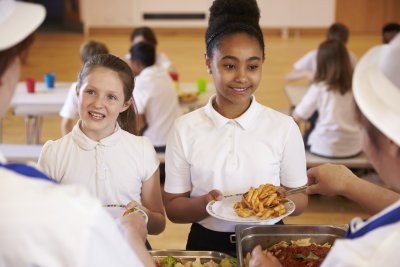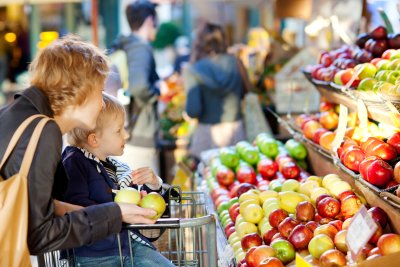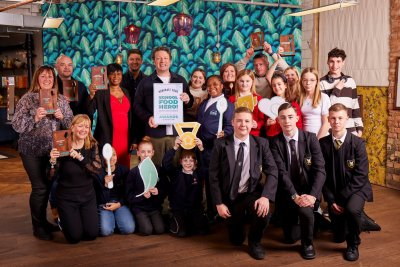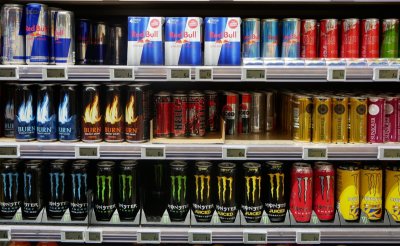News • Children's Food Campaign
Soft drinks, hard sell: Big brand names are big offenders in misleading soft drink marketing
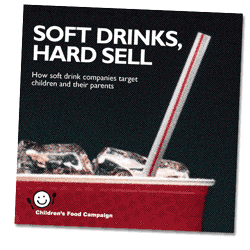 As soft drinks manufacturers anticipate high sales over the summer bank holiday, a new report, “Soft Drinks, Hard Sell”, published today by the Children’s Food Campaign exposes how these companies are using misleading marketing to target children and their parents.
As soft drinks manufacturers anticipate high sales over the summer bank holiday, a new report, “Soft Drinks, Hard Sell”, published today by the Children’s Food Campaign exposes how these companies are using misleading marketing to target children and their parents.
Examples highlighted in the report include a Britvic website which suggests that its products are better than water at keeping children hydrated, and a Vimto marketing campaign emphasising the drink’s raspberry content, despite the fact that raspberry juice makes up just 0.1 per cent of its ingredients. The research also highlights how the makers of Ribena, despite advertising its provenance and nutritional value, have to add 90 per cent of its vitamin C content artificially because it contains such a small amount of fruit juice.
The Children’s Food Campaign’s Clare Panjwani, who researched and wrote the report, said:
“Our survey found some truly misleading marketing blatantly used to drive sales and increase children’s soft drinks consumption, which contributes to tooth decay and the UK’s record rates of childhood obesity.”
She continued:
“We need better regulation to protect children from marketing for soft drinks and other junk food, and better food labelling so that parents and children can tell more easily what’s in the products they are buying. Water is by far the healthiest – and most sustainable – drink to quench children’s thirst, but it needs to be available in public places like parks so that it is easily accessible at all times.”
The report comes after the soft drinks industry reported its highest growth rate in seven years in 2010, with UK consumption reaching 14.6bn litres. This amounts to 234 litres for every child and adult in the country, and the equivalent of 642ml – almost two standard 330ml cans and more than a pint – per person each day.
ENDS
For further information and interviews, please contact Christine Haigh on 0203 5596 777 or 07870 577934 or Christine@sustainweb.org.
Notes to editors:
1) The Children's Food Campaign wants to improve children's health and well-being through better food - and food teaching - in schools, and protecting children from junk food marketing. We are supported by over 150 national organisations. The Children's Food Campaign is coordinated by Sustain: the alliance for better food and farming and funded by the British Heart Foundation. See: http://www.childrensfoodcampaign.org.uk
2) The report, Soft Drinks, Hard Sell: How soft drink companies target children and their parents, is available at https://www.sustainweb.org/publications/?id=195
3) Advertising for Britvic’s Fruit Shoot Hydro range emphasises the role it can play in keeping children hydrated. On Britvic’s Fruit Shoot-branded “Ready for Ten” website (http://www.readyforten.com/users/thirstyworkblog/posts/5127-our-tips-forkeeping-your-kids-hydrated) which is aimed at parents of children aged 6-9 years, the company’s nutritionist claims that “water can sometimes satisfy [children’s] thirst before they are actually properly hydrated, whereas squash and juice are absorbed more slowly so they will drink more”. Despite several requests, Britvic failed to provide the Children’s Food Campaign with adequate evidence to support this statement. Since our enquiries, Britvic have added references to two papers to the webpage. However, these both papers were written by representatives of the food industry and do not contain robust evidence to support the statement. The Children’s Food Campaign has therefore made a complaint about this claim to the Advertising Standards Authority.
4) Despite its name, none of the products in the Fruit Shoot Hydro range contain any fruit.
5) A recent advertising campaign for Vimto, aimed teenagers, emphasises its raspberry content, despite the fact that the raspberry content of Still Vimto is just 0.1 per cent, and less than the other fruit juices (grape and blackcurrant) the product contains. The ad is available at http://www.youtube.com/watch?v=bsvvZia2m68.
6) This summer’s advertising campaign for Ribena, which was targeted at mothers, and the product’s packaging, stresses the fact that a serving contains 100 per cent Recommended Daily Allowance of vitamin C. However, an email from the drink’s manufacturer, GlaxoSmithKlein, revealed that only 10 per cent of this vitamin C comes from the fruit juice content of the drink; the remainder is added. The ad is available at http://www.youtube.com/watch?v=8CaM6t5-4BA.
7) Sugar-sweetened soft drinks are a source of energy. When energy intake exceeds energy expenditure, people gain weight. However, there is also evidence suggesting that artificially sweetened drinks may also lead to weight gain by encouraging a preference to sweet food and drink.
8) Figures from the National Child Measurement Programme for the school year 2009/10 show that the proportion of children in England who are overweight or obese continues to rise. The number of children who are overweight or obese by the time they reach Year 6 (age 10/11) has reached 33.4 per cent, an increase of 0.8 percentage points on the previous year. For more information see http://www.ic.nhs.uk/ncmp. The UK is now the fattest nation in Europe. For more information, see http://www.bbc.co.uk/news/health-11983915
9) Both sugar- and artificially-sweetened drinks can damage the teeth. It is estimated that between 52% and 77% of children aged 8 to 15 have some obvious tooth decay in their permanent teeth. For more information, see http://www.nhs.uk/conditions/Dental-decay/Pages/Introduction.aspx).
10) The Children’s Food Campaign is calling for drinking fountains or other sources of drinking water to be made available in all public parks. For more information, see https://www.sustainweb.org/childrensfoodcampaign/waterinparks/
11) For more information on the UK soft drinks market, see http://www.britishsoftdrinks.com/PDF/2011%20soft%20drinks%20report.pdf
Published Monday 29 August 2011
Children's Food Campaign: Better food and food teaching for children in schools, and protection of children from junk food marketing are the aims of Sustain's high-profile Children's Food Campaign. We also want clear food labelling that can be understood by everyone, including children.


